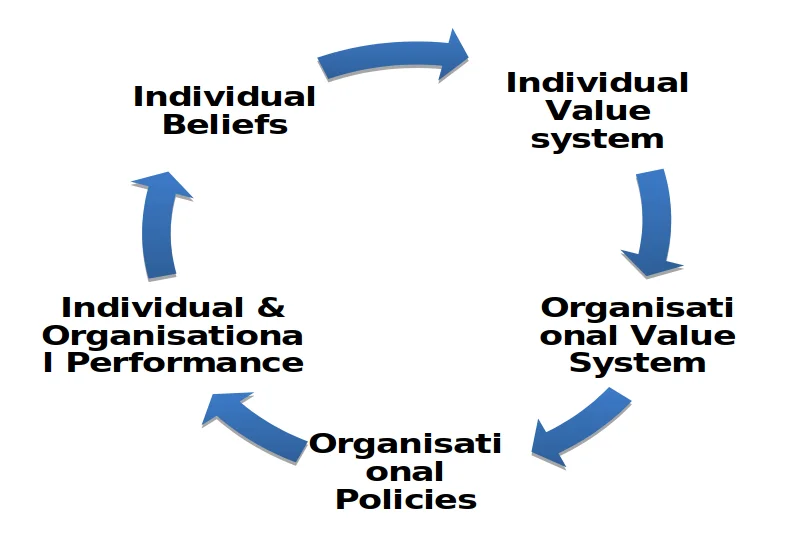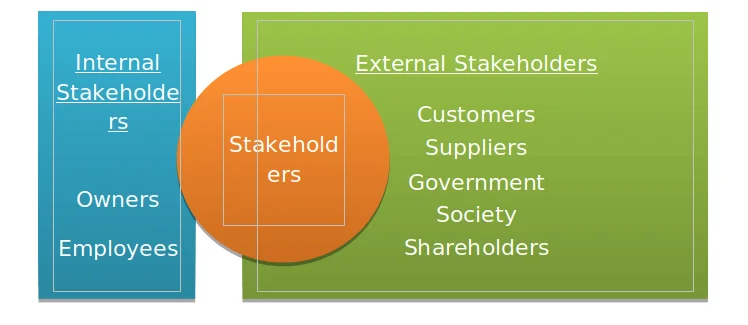
Deepika Soni
sonideepika@indianoil.in

Abstract – The chain reaction
In the present era, where growth is exponential, development is rapid and materialism is rising on the graph, values are being interpreted and misinterpreted at an individual level and consequently at an organisational level similar to a chain reaction.

Individual values are the basic fundamental beliefs held by an individual and such beliefs directly govern their priorities, behaviour, activities and interaction with community. In other words, it could be said that human values impact human behaviour which in turn impacts organizational performance and values.
Partnering in the development of value system is vital at an organizational level not just for individual benefit but also for organizational benefit as a whole because individual value systems and consequent behavioural patterns have a direct bearing of overall performance of organization in long-term.
Corporate Concern
Corporates and business organisations have corporate missions and strategic objectives to ensure the success of the organisation in the long run. One of the operational objectives of these organizations is corporate social responsibility. In today’s world, corporate social responsibility is not limited to just monetary donation or materialistic provisions. Giant corporates represent the society and are in a position to instil changes in society. Hence, the task of inculcating a healthy value system should begin at this level. One person spreads his value to many in his lifetime and if the value system is created or moulded in a righteous manner then, eventually those values are reflected in every facet of life and help in nurturing the society as a whole. This would also reflect upon the overall performance of business organisations through an amalgamation of happy stakeholders.
Defining Value
Gellermann, Frankel, & Ladenson (1990) define values as standards of importance human beings use in making choices. The major function of values is to serve as criteria for making decisions, establishing goals, and setting priorities (Williams, 1968; Hultman, 2006). Values are subjective and every individual or entity has own perception of values. Accordingly, it is of paramount importance to specifically define values and develop a value system to create a culture in long-term which is directly aligned to the strategic, tactical and operational objectives of an organization. In absence of clearly defined value system, streamlining the behaviour of workforce and channelizing their efforts towards a values system perceived by higher management would be a far-fetched dream.
Shared Value Creation – A Novel and Coherent approach imbibe Business and Social Values
In present era of where monopoly & autonomy are fading away and the stakeholders of a business are impacting every business pervasively like never before, creating an organisational value system based on shared value creation can pave the way for a greater coherence between the organisation and stakeholders.
The concept of “creating shared value” is a business concept introduced by Michael E. Porter, a leading authority on competitive strategy and head of the Institute for Strategy and Competitiveness at Harvard Business School, and Mark R. Kramer, Kennedy School at Harvard University and co-founder of FSG.
The central idea of creating shared value is that the competitiveness of a company and the health of the communities around it are mutually dependent. Shared value creation is different from Corporate Social Responsibility. Shared-value-creation is not an act of benevolence rather it is a self-beneficial act to create business value by creating societal value. CSR dwells upon the premise of uplifting society and is primarily driven by statutory requirements whereas shared value creation is paying to society with a clear intention of receiving back in terms of business value. For example creating a less-expensive product line by dedicating additional resources to meet the needs of low income group will not only meet the needs of that group but also pay back the organisation in terms of increased revenue, public image, govt. support etc. Exploring this novel field with appropriate planning and vision can pave the way for many opportunities.
Stakeholder’s identification, analysis and management
Analysing and defining a framework of stakeholders is an important step of defining organizational values. Once a definite framework of stakeholders is established, the organisation can focus on creating shared values. A representational framework of stakeholders is produced below:

Planned implementation of Share Value Creation
An organization may undertake “Shared value creation” by making conscious efforts in this direction. Suggestive activities in creating shared values are as follows:
Reconceive products and markets to provide appropriate services and meet unmet needs.
Redefine productivity in the value chain to mitigate risks and boost productivity. Example, defining standard operating procedures for boosting productivity at every working level.
Enable local cluster development by improving the external framework that supports the company’s operations. Example, training suppliers to meet specific needs
Reframing organizational hierarchical structure in line with above to align achievement of desired results
There are suggestive business models are in place to implement “Shared Value Creation”. In addition to these, tailor-made specific models may be developed with professional consultation.
Conclusion
The entire process of defining values, chalking out plans for implementation of perceived values, improvising and innovating to achieve values through shared value creation via suggestive or specific models should be developed precisely in a professional manner. Shared value is a relatively new but a thought provoking concept which could pave way for better alignment of strategic goals of an organisation. Adopting the same and continuously evolving to achieve better results may help in sustaining the present volatile world. The field has been explored by many international organizations and is under continuous development. In Indian context organizations are fulfilling responsibilities towards stakeholders and society through the “traditional CSR” or unknowingly through “Shared value creation” as per the research conducted by FSG. Bringing this concept to the forefront where organisations can capitalise the benefits and at the same time reciprocate to the stakeholders, and creating critical success factors (CSFs) and key performance indicators (KPIs) to measure the benefits of the same may lead to tremendous benefits in form of Government & public support. After all “Win-win” for all is a key for long-term sustainability”.
References:
Definition & functions of values
https://www.researchgate.net/publication/318254710_Unleashing_the_power_of_values
Concepts related to shared value:
https://sharedvaluehk.org/what-is-creating-shared-value/
Concepts related to shared value
https://en.wikipedia.org/wiki/Creating_shared_value
Shared value creation in India
https://www.theguardian.com/sustainable-business/blog/india-shared-value-projects
Posted in HR Business Synergy | No Comments »
Recent Articles
- Networks and Blue Oceans.
- Unleashing Competitive Advantage through Network Effects
- Altruism will elevate the CSR to the next level
- Energy Transition – Story of Net Zero, Human Resources and the dance of elephants
- The Wise Monkeys of Safety
- Decision Making for Organizational Sustainability
- Creating Compassionate Climates through Resonant Leader
- HR Management Issues and Emerging Global Trends
- A life beyond metrics
- HR Practices for New Age Workforce at Hardship Locations
- Replacing the “Oil” in Oil Marketing Companies: An HR Perspective on ICE-to-EV Transition
- Media & Boundary Management Practices and Role of HR
- Green HRM in Post Pandemic World: Opportunities and Threats
- The Perils of Green Washing and Woke Washing
- Green HRM and achieving Organisational Goals with special reference to Cochin International Airport Limited (CIAL)
- Ontology of Green HRM
- Changing Face of Energy man in an increasingly Digitalised world
- Philanthropy No More: Resonating Social contribution with Business Value
- Total Productive Maintenance, a panacea for improving reliability of Plant, Equipment & profitability & optimizing the Human Resources
- HR Business Synergy
